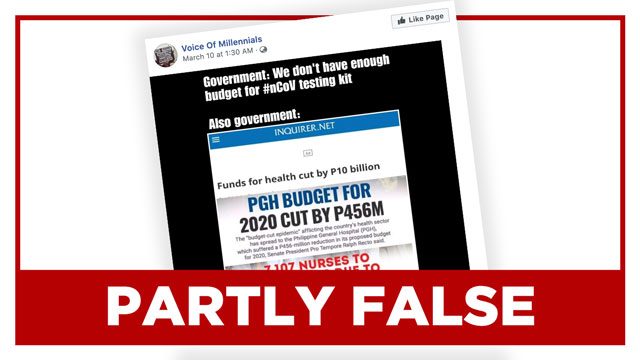SUMMARY
This is AI generated summarization, which may have errors. For context, always refer to the full article.

Claim: Many critics of President Rodrigo Duterte slammed his administration for “slashing” P10 billion from the funds allocated for the Department of Health (DOH) in the 2020 national budget.
They used this argument to highlight what they perceived as the government’s “poor” response to the coronavirus outbreak.
For instance, Facebook page Voice of Millennials on March 10 shared a graphic with screenshots of a news article and social media graphics from news organizations about budget cuts in the health sector – including the P10-billion “reduction” for DOH – along with a remark about government not having funds to buy testing kits for the coronavirus.
Former Commission on Filipinos Overseas chief Imelda Nicolas shared the same graphic on March 10.
Their posts were flagged by Facebook’s Claim Check tool for verification.
In response, Presidential Communications Operations Office (PCOO) Assistant Secretary Ramon Cualoping III countered this claim in a Facebook post on Monday, March 16, pointing out that the DOH’s budget actually increased in the 2020 budget compared to the 2019 budget.
He included a screenshot of the bar graph in a Rappler report that summarized the approved 2020 budget. The graph showed that the budget for the health department – including the allocations for the Philippine Health Insurance Corporation (PhilHealth) and DOH’s attached agency National Nutrition Council (NNC), went up to P172.37 billion in 2020, from P165.92 billion in 2019.

Rating: PARTLY FALSE
The facts: The National Expenditure Program (NEP), also known as “the President’s budget,” initially proposed a lower budget for DOH for 2020 compared to 2019. This was eventually increased in the approved 2020 General Appropriations Act (GAA) or national budget after deliberations in Congress.
The President’s critics only focused on the decrease in the NEP. However, Cualoping missed mentioning the efforts in Congress to increase or restore the budget of the DOH.
In the 2020 NEP – the “draft” of the national budget that the executive department via the Department of Budget and Management submits to Congress – the DOH-Office of the Secretary (DOH-OSec) was initially set to receive only P88.26 billion. This is lower than the P97.65 billion that it got in the 2019 GAA.
In addition, the proposed 2020 budget for PhilHealth stayed the same as in 2019, at P67.35 billion.
Some lawmakers pointed out this proposed decrease in DOH’s budget, as reported by Rappler and other news outlets in September and October 2019.
For instance, in a statement on September 19, Senator Risa Hontiveros vowed to “restore the billions of pesos slashed” from DOH “to boost government efforts against the dengue and measles outbreaks and ensure the effective implementation of the Universal Healthcare Act.” (READ: Hontiveros says DOH’s P10-billion budget cut an ‘attack on public health’)
On September 23, Iloilo Representative and ex-health secretary Janette Garin slammed the proposed cut in the DOH budget, the Philippine Daily Inquirer reported, following the House’s passage of its version of the 2020 budget on September 20.
Senator Bong Go also sought a higher budget for DOH, the Inquirer reported on September 25. Go said that the lower proposed budget was mainly due to the department’s underspending, citing information from budget officials.
Senator Ralph Recto also argued on October 10 that over 10,000 health personnel “could lose their jobs” because of the then-DOH budget cut.
In the end, after bicameral discussions in Congress, the DOH’s budget was increased. Health Secretary Francisco Duque III also said that the Department of Budget and Management (DBM) “agreed to restore” the initial cuts in DOH’s budget, reported ABS-CBN News on October 29.
In the final version of the 2020 national budget, which President Duterte approved on January 6, 2020, the DOH-OSec received P100.56 billion. PhilHealth’s budget also went up by P4 billion, to P71.35 billion. The President did not veto these increases.
Here’s a breakdown of the DOH budget as listed in the 2019 GAA, the 2020 NEP, and the approved 2020 GAA. These amounts do not include automatic appropriations.
Among the programs, the health systems strengthening program got a big decrease in the 2020 GAA versus 2019, from P25.9 billion in 2019 to P19.33 billion in 2020, or lower by P6.57 billion. In the 2020 NEP, it was originally proposed to have an even lower allocation, at only P9.64 billion.
This program covers the following sub-programs: service delivery (including funds for the health facilities enhancement program), health human resource, and health promotion.
However, this was offset by the increase in the health facilities operation program – from P32.5 billion in 2019 to P42 billion in 2020, or higher by P9.5 billion. The program’s approved budget in 2020 was also higher than the P41.1 billion originally proposed in the 2020 NEP.
In this program are the following sub-programs: curative health care (for operations of blood centers and DOH-run hospitals) and rehabilitative health care (for operations of government-run drug rehab centers).
Rappler was able to talk to the Voice of Millennials page on Facebook to point out its error. The page deleted their post, but did not issue a correction afterwards as of writing.
Rappler also reached out to Nicolas, but has yet to receive a response as of writing.
Meanwhile, journalist Inday Espina Varona – who also made a similar claim on March 14 using a different set of screenshots of news reports about the DOH “budget cut” – issued a correction on March 18 and updated her original post. – Rappler.com
Keep us aware of suspicious Facebook pages, groups, accounts, websites, articles, or photos in your network by contacting us at factcheck@rappler.com. Let us battle disinformation one Fact Check at a time.
Add a comment
How does this make you feel?
There are no comments yet. Add your comment to start the conversation.